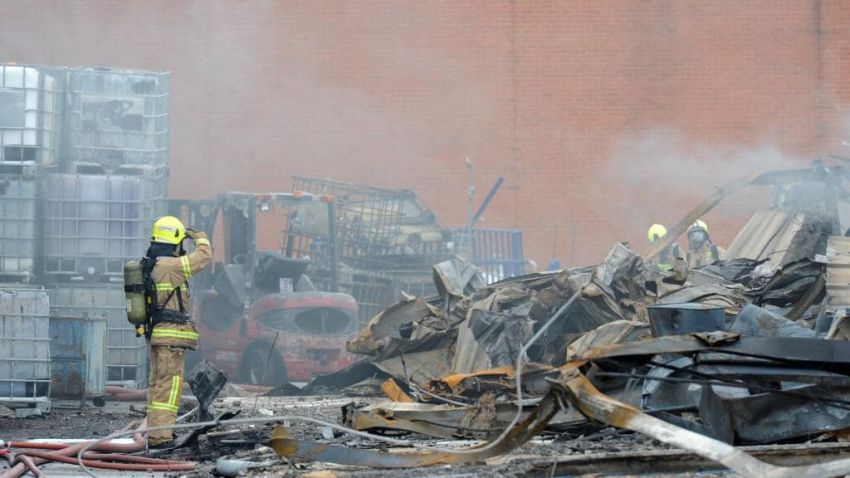
“It’s almost an annual event — year in year out — that people in Broadmeadows have to cop a factory fire [and] have to cop toxic shit dumped on them”, local resident Marcus Harrington told an April 5 rally of angry northern suburbs residents after another chemical blaze erupted early that morning.
The huge chemical fire at Bradbury Industrial Services, which recycles paint and solvents, was the fourth toxic fire in the region in three years.
Residents in Broadmeadows, Campbellfield, Coolaroo, Dallas, Somerton and Pascoe Vale were told to stay indoors and 11 local schools were closed for a day as a result of the fire. Many locals had to go to hospital, some with life-threatening asthma attacks and two workers were badly affected.
Vignesh Varatharaja had been pumping a chemical drum when it exploded. His body caught fire.
A Change.org petition to raise money for Varatharaja and his family explains that a co-worker had tried to extinguish the fire using a fire hose, but it was broken. He then took Varatharaja to a nearby hospital, where he remained for days in the specialist burns unit.
Varatharaja fled Sri Lanka’s civil war as a refugee in 2013.
Anujan Tharumarasa, who previously worked at the plant, told Green Left Weekly that while “this incident has come as a surprise to many in the community, workers at this workplace have been raising concerns for many months.
“Whenever we had workplace incidents, our boss tried to bury it under the carpet ... I left this job because of the safety concerns. My friends continued to work there because they had no option because of their visa conditions.”
Tharumarasa unionised the workforce last year. Employees then took action against the boss over wage theft and unfair dismissals, “but safety continued to be a problem”.
“Today we’re faced with an environmental disaster because of a greedy boss who was willing to make money at the expense of workers’ lives.”
Bradbury Industrial Services has form when it comes to a lack of health and safety on the job. Workers told GLW of previous fires at the plant.
There have also been other fires in the northern suburbs as a result of chemical or recycling material stockpiling.
In 2017, a fire at the SKM Recycling plant in Coolaroo led to the evacuation of 115 homes. It took firefighters days to extinguish the blaze.
SKM Recycling is responsible for recycling almost half of Melbourne’s waste.
There were also fires at an illegal chemical storage factory in West Footscray last year and at a recycling plant in Geelong.
The owner of the West Footscray factory owns several other illegal chemical stockpiles in Melbourne’s northern and western suburbs.
The Environment Protection Authority (EPA) said on March 15 it had suspended Bradbury Industrial Services’ licence to accept waste after an inspection found that it was storing 400,000 litres of hazardous chemicals when it was licensed to only store 150,000 litres.
Victorian Socialists federal candidate for the northern suburbs seat of Calwell Jerome Small told a protest on April 8 that when he asked why the EPA had not used its “step in” powers to remove the major hazard, the authority responded that “private companies have rights too”.
In my capacity as a local councillor I have discovered that there is a large amount of toxic waste being produced at thousands of industrial sites all over Melbourne.
Yet no thought is given to its safe disposal or to neutralising toxic chemical waste. Companies then close down and the mess is left for residents and workers to deal with.
Community group Toxic Free Fawkner campaigned to stop a warehouse development on a toxic site in Fawkner.
Chemicals that make up Agent Orange were produced on the site from the late 1950s to the mid-1970s by corporate giant Nufarm. It is still heavily contaminated despite a partial clean-up in the early 1990s.
People think authorities will protect them from toxic chemical pollution. However, the experience in Fawkner showed that, if not for the community campaign to stop the warehouse development, the extent of the dioxin-contaminated site would not have been acknowledged by the local council or the EPA, which sees its primary role as facilitating development.
Harrington pointed out that legal and illegal chemical stockpiles are located only in working-class suburbs.
He told the April 5 rally, “Every time you turn on the TV, some Liberal wanker says, ‘There’s got to be a tough cop on the beat to police union officials and construction workers’. “Where is the ‘tough cop on the beat’ to police these companies that are storing chemicals in warehouses?
“The northern suburbs’ reward for voting Labor each election is getting toxic chemicals dumped on them every year.
“People have had enough.”
The United Firefighters Union (UFU) launched a campaign on April 15 to ensure that people responsible for illegal dumping are held to account.
UFU Branch secretary Peter Marshall said the union wants the state government to protect firefighters from “what is becoming an ever-increasing criminal business model of illegal transporting and stockpiling of chemical waste”.
The UFU is “seeking to make the individuals accountable by law” with civil litigation for firefighters who become ill as a result of fighting fires involving illegal toxic materials.
Marshall said “it is well-known and irrefutable that career firefighters are more susceptible to certain types of cancer-related illness as a result of their exposure to toxic plumes in protecting the community”.
He said the union was launching a public awareness campaign to identify illegal dumping sites.
[Sue Bolton is a Socialist Alliance Moreland councillor, a founder of Toxic Free Fawkner and the Victorian Socialists candidate for the federal seat of Wills.]